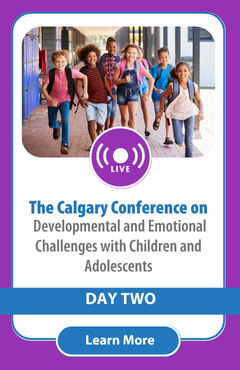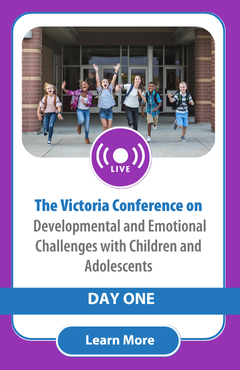Hidden Keys to Student Engagement & Addressing Developmental and Early Attachment Trauma
Presented by Gordon Neufeld, Ph.D. and Patti Ashley, Ph.D., LPC
Live Streaming November 19, 2025
$244.00
6 Hours | Pre-approved for CEU’s
somdn_product_page
Description
LIVE STREAM: November 18 – 20, 2025 from 8:30am – 4:00pm (Calgary, AB) Please adjust your start time according to your specific time zone.
ON-DEMAND: Recorded footage & course content (certificate, videos, quiz) will be available until December 22, 2025. Please allow 3 – 10 business days for footage to be processed. Extensions cannot be granted under any circumstances.
November 19, 2025 | Day Two

Hidden Keys to Student Engagement: Optimizing Learning and Well-being
No issue has ever been more important in education than how to engage students in the learning process. The lack of engagement of today’s students is therefore quite alarming. The downward trend has been noticeable for some time but has become even more acute after the pandemic. Teaching longer or harder has not been the answer. Changing curriculum is a never-ending exercise but also somewhat futile in making the needed difference. Restricting digital devices helps somewhat but doesn’t get to the root of the problem. Curiosity is fading: motivation is waning; mental health is deteriorating; and teacher burnout is escalating. This isn’t the complaint of only one school district or region; this phenomenon appears to be rather widespread. Dr. Neufeld insists that we cannot address a problem we do not truly understand. He will present a two-phase model of student engagement that will not only make sense of what is happening to today’s students, but also show us a way through, even with the hardest to reach students in our classes. We all want our teaching to translate into student learning. Our effectiveness and even our professional fulfillment depend upon it.

Addressing Developmental and Early Attachment Trauma
This training provides clinicians and educators with a comprehensive understanding of the impact of developmental and early attachment trauma on emotional, cognitive, and social development. Participants will explore the neurobiological and psychological effects of early adverse experiences, including disruptions in attachment, neglect, and abuse. The training will focus on identifying trauma symptoms, understanding trauma-informed care, and learning effective strategies to support healing in children, adolescents, and adults affected by early trauma. Through case studies, video examples, and practical tools, attendees will deepen their knowledge of trauma-responsive interventions and develop skills to facilitate recovery, promote resilience, and foster secure attachment in their professional practice.
Fostering Social-Emotional Learning in Children and Adolescents
This engaging and interactive professional development session is designed to equip educators with the knowledge, strategies, and tools needed to foster social and emotional learning (SEL) in children and adolescents. Grounded in research-based practices, this training explores the five core competencies of SEL—self-awareness, self-management, social awareness, relationship skills, and responsible decision-making—and their vital role in student success both in and out of the classroom.
Participants will learn how to create emotionally supportive learning environments, build strong teacher-student relationships, and integrate SEL into daily routines and academic instruction. Through real-world examples, hands-on activities, and collaborative discussion, educators will walk away with actionable strategies to support students’ emotional development, resilience, and well-being.
- Make sense of what is happening to today’s students
- Understand why the keys to student engagement are hidden and need to remain that way, especially to the student
- Learn the fall-back position when the usual keys to student engagement are not working
- Discover the difference between the keys that are universal in nature and the keys that only work for students whose human potential is spontaneously unfolding
- Understand the roles of relationship and play in engagement
- Understand the developmental roots of curiosity, mature integrative functioning, and learning from mistakes
Understand the Impact of Developmental and Early Attachment Trauma
- Describe the neurobiological and psychological effects of early trauma on brain development, emotional regulation, and attachment.
- Identify the key factors contributing to developmental and attachment trauma, including neglect, abuse, and disrupted caregiver relationships.
Recognize Trauma Symptoms in Children, Adolescents, and Adults
- Recognize behavioral, emotional, and physical signs of early attachment trauma in various age groups.
- Differentiate between trauma responses and typical developmental behaviors, with a focus on subtle and complex trauma symptoms.
Utilize Trauma-Informed Care Approaches
- Define trauma-informed care principles and discuss their application in clinical and educational settings.
- Apply trauma-sensitive communication strategies to create a safe and supportive environment for individuals affected by early trauma.
Assess Attachment Patterns and Attachment Styles
- Identify and assess different attachment styles (secure, anxious, avoidant, disorganized) and their origins in early trauma.
- Learn how to conduct assessments and use attachment-based frameworks to inform interventions.
Integrate Healing Techniques and Strategies
- Explore evidence-based practices and therapeutic interventions for healing developmental and attachment trauma, such as attachment-focused therapy, somatic and mindfulness techniques.
- Discuss strategies for supporting secure attachment and building resilience in individuals affected by early trauma.
Collaborate with Caregivers and Support Systems
- Develop strategies for engaging with caregivers, families, and support systems to foster healing and create secure attachment bonds.
- Understand the importance of a collaborative approach in healing trauma and supporting long-term recovery.
Enhance Professional Self-Awareness and Compassionate Practice
- Cultivate self-awareness regarding the emotional impact of working with individuals affected by early trauma.
- Learn practices to manage secondary trauma and enhance personal resilience in the professional context.
- Define social and emotional learning and explain its impact on academic and behavioral outcomes.
- Identify and apply the five core SEL competencies in classroom settings.
- Recognize the unique SEL needs of children versus adolescents.
- Implement practical strategies to build a positive, inclusive, and emotionally supportive classroom climate.
- Integrate SEL into academic content and daily classroom interactions.
Education and Clinical Professionals: K–12 Classroom Teachers, School Counsellors/Psychologists, Learning Assistance/ Resource Teachers, School Administrators, School Paraprofessionals including Special Education Assistants, Classroom Assistants and Childcare Workers. All other professionals who support students including but not limited to: Nurses, Social Workers, Psychologists, Clinical Counsellors, Family Therapists, Occupational Therapists, Speech Language Pathologists, Addiction Counsellors, Youth Workers, Mental Health Workers, Probation Officers, Police Officers, and Early Childhood Educators.
Parents, Caregiver, Foster Parents, Grandparents, and Extended Family raising a child.
Dr. Gordon Neufeld is a Vancouver-based developmental psychologist with over 50 years of experience with children and youth and those responsible for them. A foremost authority on child development, Dr. Neufeld is an international speaker, a bestselling author (Hold On To Your Kids) and a leading interpreter of the developmental paradigm. Dr. Neufeld has a widespread reputation for making sense of complex problems and for opening doors for change. While formerly involved in university teaching and private practice, he now devotes his time to teaching and training others, including educators and helping professionals. His Neufeld Institute is now a world-wide charitable organization devoted to applying developmental science to the task of raising children. He is a father of five and a grandfather to seven.
International workshop presenter, author, and psychotherapist Patti Ashley, Ph.D, LPC, has integrated 40 years of experience in special education, child development, and psychology into her wholehearted work as a psychotherapist, author, international speaker, and authenticity architect coach. She brings unique insights into the identification and treatment of shame, trauma, grief, and dysfunctional family patterns.
Dr. Ashley owns and operates Authenticity Architects in Boulder, Colorado. Her inimitable Authenticity Architects model facilitates long-term changes in the brain and nervous system, helping clients break through unconscious barriers and rediscover a sense of self-love, belonging, and connection.
Patti has counselled a myriad of individuals, couples, families and groups in mental health agencies, psychiatric hospitals, and private practice settings. She also has many years of experience developing continuing education courses for physicians, hospital wellness programs, universities, and other organizations.
Dr. Ashley holds a Doctor of Philosophy Degree in psychology from the Union Institute and University, a Master of Education Degree in early childhood from Old Dominion University, and a Bachelor of Science Degree in special education from James Madison University. She is the author of Living in the Shadow of the Too-Good Mother Archetype (2014), Letters to Freedom (2019), and Shame-Informed Therapy: Treatment Strategies to Overcome Core Shame and Reconstruct the Authentic Self (2020).
| Registration | Early bird Fee | Regular Fee |
|---|
| Individual 1 Day Enrollment | $244.00 | N/A |
| Individual 2 Day Enrollment | $484.00 | N/A |
| Individual 3 Day Enrollment | $664.00 | N/A |
All fees are in Canadian dollars ($CAD) and per person.
Group rates and student discounts are available. Please contact webinars@jackhirose.com for more information.
Fees are per person, seat sharing is not allowed. Please respect this policy, failure to comply will result in termination of access without a refund. For group rates please contact webinars@jackhirose.com
- Canadian Psychological Association
The Alberta College of Social Workers (ACSW) and the Newfoundland and Labrador Association of Social Workers (NLASW) accept CPA-approved continuing education credits







